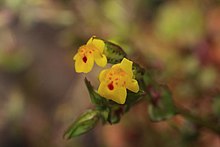Erythranthe laciniata, synonym Mimulus laciniatus,[1] is an uncommon species of flowering plant known by the common name cutleaf monkeyflower, it is endemic to the High Sierra Nevada in California.
| Cutleaf monkeyflower | |
|---|---|

| |
| Scientific classification | |
| Kingdom: | Plantae |
| Clade: | Tracheophytes |
| Clade: | Angiosperms |
| Clade: | Eudicots |
| Clade: | Asterids |
| Order: | Lamiales |
| Family: | Phrymaceae |
| Genus: | Erythranthe |
| Species: | E. laciniata
|
| Binomial name | |
| Erythranthe laciniata | |
| Synonyms[1] | |
| |
Description
editErythranthe laciniata is an annual herb producing a mostly hairless stem reaching maximum heights between 3 and 38 centimeters.[2] The oppositely arranged leaves are up to 5 centimeters in length and generally oval in shape, though some of them are divided into lobes.[3] The inflorescence is a raceme of several tiny red-spotted yellow flowers each 4 millimeters to 1.5 centimeters long. The tubular base of each flower is encapsulated in a ribbed, reddish calyx of sepals.
Distribution
editErythranthe laciniata is endemic to the High Sierra Nevada in California, where it most often grows in moist areas on granitic soils.[4]
References
edit- ^ a b "Erythranthe laciniata (A.Gray) G.L.Nesom". Plants of the World Online. Royal Botanic Gardens, Kew. Retrieved 2022-04-16.
- ^ Sweigart, Andrea L.; John H. Willis (November 2003). "Patterns of Nucleotide Diversity in Two Species of Mimulus Are Affected by Mating System and Asymmetric Introgression". Evolution. 57 (11): 2490–2506. doi:10.1111/j.0014-3820.2003.tb01494.x. PMID 14686526.
- ^ Vickery, Robert K. Jr. (March 1964). "Barriers to Gene Exchange Between Members of the Mimulus guttatus Complex (Scrophulariaceae)". Evolution. 18 (1): 52–69. doi:10.2307/2406419. JSTOR 2406419.
- ^ Fenster, Charles B.; Kermit Ritland (September 1994). "Evidence for Natural Selection on Mating System in Mimulus (Scrophulariaceae)". International Journal of Plant Sciences. 155 (5): 588–596. doi:10.1086/297197. JSTOR 2475032. S2CID 84422852.
External links
edit